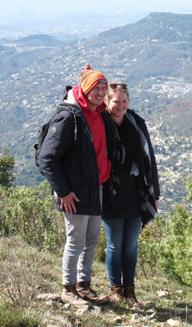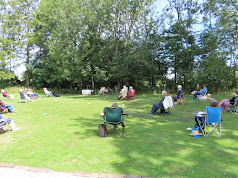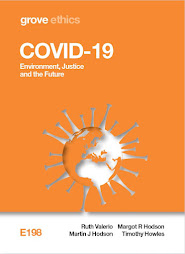Happy Christmas! We hope you are all doing well.
This year has been a bit of a momentous one for us. In May, after a year of preparations, we finally moved into our new house in Grove, Wantage. So after 23 years of living in vicarages, college accommodation etc. we are finally back in our own home. There is still quite a bit to do on it, particularly with the garden, but we are very happy.
The move has meant that Margot has stopped being on salary and is effectively freelance with our environmental work. Grove was where Margot had her curacy 20 odd years ago, and we have rejoined our old church. We still know lots of people, and have been made very welcome! Margot has PTO (permission to officiate) and Martin has retained his authorised preacher status, which means we have taken a few services already in the benefice, and will do some over Christmas. But it is definitely not the same as every week.
Our work on the environment in the church continues to grow, particularly in theological colleges. We led a whole module on “Creation Care and Christian Mission” for All Nations Christian College in the first three months of the year, and invitations to teach in colleges continue to come in. We also went to a reunion for Margot’s year group at ANCC. It was wonderful to see everyone, including Margot’s old roommate. In the autumn we were out most weekends speaking at churches. We published a new Grove booklet, “The Ethics of Environmental Management”, which came out just in time for the COP meetings in the autumn. Earlier in the year Martin had the opportunity to interview one of his great heroes, Michael Mann, the American climate scientist, about his new book. Martin himself was interviewed by the Church Times (a slightly odd effort!).Very unexpectedly, Martin’s research continues to take off! Four papers have appeared in international journals, the best for many years. Some work on carbon sequestration in phytoliths looks particularly promising and was picked up in a blog by Oxford Brookes (this was a better interview!).We were pleased that American relatives, Greg & Pam and Peter & Annie were able to visit us during the year. Margot’s sister, Karen and her husband John housesat for our two-week holiday in September. We were very brave and took our electric car on the ferry from Portsmouth to St Malo for a stay in a nice gite in Brittany. Charging the car was easier than in England! Lots of nice walks and meals, and relaxing after the move. In the summer we held two big social events at our new house: a house blessing with our Sage friends from Oxford; and a day with almost all of Margot’s relatives.
And so to 2025. Who would believe it is 2025 and we are a quarter of the way through the century? Our 2025 is shaping up to be more of the above. We hope yours is a good one, and that we see many of you at some point!
Martin and Margot



























